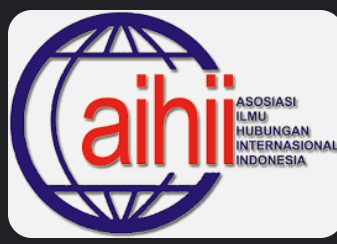Interaksi Antar Negara Asean Plus Three Terhadap Proses Institusionalisme Second Track Diplomacy: Neat 2009- 2019
DOI:
https://doi.org/10.33822/mjihi.v3i2.2347Kata Kunci:
NEAT, second track diplomacy, think tank, Epistemic Community, International InstitutionAbstrak
This paper aims to answer the question on “ How is the interaction among the ASEAN Plus Three countries in the process of institutionalization of Network of East Asian Think-tanks (NEAT) in The ASEAN Plus Three Regionalism?”. The objective of this research is to get an explanation on the interaction between every country in the ASEAN Plus Three Regionalism on the NEAT institutionalization. This research uses the document research as the study method. As an international institution NEAT is an epistemic community As an epistemic community NEAT holds a variety of research which called as working groups. The result of the working group will be recommended as a policy recommendation. This recommendation will be delivered to the APT leaders to be amendment as a policy. Haas says, as a think tank NEAT directly identifies the state interests and illuminates the decision makers about the salient dimensions of the issue. After that the decision makers in one state may, in turn, influence the interests and behavior of other states. Different with another approachment the actor of an epistemic community is an individual states but still sometimes there tends to be a hegemony of idea in the process of policy decision. In balance with Ikenberry theory that if there is any leading state joins an international institution then that sleading state will ripe another weaker state in order to pursues their interests. This paper suggests that NEAT should enhance the institutionalization as the first official think tank in APT regionalism.
Referensi
Referensi
Buku
Arifin, Sjamsul. (2008). Masyarakat Ekonomi ASEAN 2015:Memperkuat Sinergi ASEAN Ditengah Kompetisi Global. Jakarta: PT Elex Media Komputindo.
Bela ,Balassa. (1976)Types of Economic Integration, World Bank Reprint Series. Washington, D.C.
Chirathivat, Suthipand. (2004). ASEAN’s Role and Interests in the Formation of East Asian Regionalism. Political Issues and Economic Perspectives.101.
Djafar, Zainuddin. (2008)Indonesia, Asean dan Dinamika Asia Timur: Kajian Perspektif Ekonomi-Politik, Jakarta:Pustaka Jaya.
Neuman, W. Lawrence. (2000). Social Research Methods Qualitative and Quantitative Approaches (4th ed.). United States of America
Rodolfo C. 2006). Severino. South East Asia in Search of an ASEAN Community. Singapore:ISEAS.
Ruggie,John Gerrard. (2003). Constructing the World Polity: Essays on International Institutionalization (2nd ed.).London:Routledge.
Soesastro, Hadi, &Joewono, Clara. (2006). Twenty Two Years of ASEAN ISIS Origin, Evolution and Challenges of Track Two Diplomacy. Yogyakarta: Kanisius Media.
Sungkar, Yasmin. (2005). Strategi ASEAN Dalam Perluasan ASEAN +3. Jakarta: LIPI. Veseth , Michael. 1996) Introduction to International Political Economy. United States of America: Prentice-Hall, Inc.
• Dokumen East Asia Vision Group. (2001). Towards an East Asian Community: Region of Peace, Prosperity and Progress. East Asia Vision Group Report.
Website
NEAT 2004. Februari 2010 http://www.neat.org.cn/english/zjdyen/index.php?topic id=001001
CSCAP. (1999). Juni 2010. CSCAP is A Non-Governmental (secondtrack) Process for Dialogue on Security Issues in the Asia Pacific. http://www.cscap.org/
Diamond, Dr. Louise. McDonald, John. (1996).Multi-Track Diplomacy. United States of America: Kumarian Press.
Direktorat Jenderal Kerjasama ASEAN Departemen Luar Negeri Indonesia. (2001). Pemulihan Ekonomi Indonesia Melalui Kerjasama Investasi dan Perdagangan Dengan Mitra Wicara ASEAN +3 (China-Jepang-Korea Selatan). Jakarta:Author.
Feld, Werner. J., &Jordan, Robert. S. (1983). International Organizations: A Comparative Approach. New York: Praeger.
Ikenberry,G. John. (2003). State Power and the Institutional Bargain: America’s Ambivalent Economic and Security Multilateralism. US Hegemony and International Organizations. New York: Cambridge University Press.
Krasner,Stephen.D. (1995). Power politics, institutions, and transnational relations. Bringing transnational relations back in. New York:Cambridge University Press.
Jurnal
Phar, Kim Beng. (2001). Track Two Discussion and Regionalism.
Haas, Peter.M. (1992). Introduction: Epistemic Communities and International Policy Coordination. Journal of International Organization.
Ikenberry, John. (1998). Institutions, Strategic Restraint, and the Persistence of American Postwar Order
Sundstorm, Mikael.(2000). A Brief Introduction: What is an Epistemic Community?.
Mursitama, Tirta.(2012). Second Track Diplomacy in ASEAN+3: The Case of Indonesia and Network of East Asia Thinkt- Tanks (NEAT).
Wong , John. 2012 Thinktanks in East Asia in Need of More Cooperation and Networking: NEAT After its Ten Years





